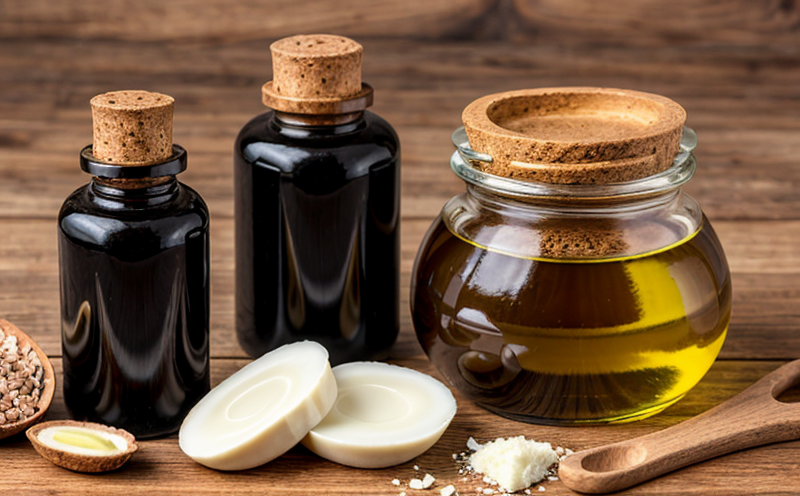USP Fats and Fixed Oils Testing
The United States Pharmacopeia (USP) [1] chapter outlines stringent guidelines for the testing of fats and fixed oils. This service is critical in ensuring that these substances meet the highest standards of purity, quality, and safety as required by regulatory bodies.
Fats and fixed oils are essential components in a wide array of pharmaceutical products, food items, cosmetics, and other consumer goods. Ensuring their quality through testing is paramount to safeguarding public health. USP addresses various aspects including the identification, assay, and tests for specific impurities that could affect product safety.
The testing process involves several key steps such as sampling, sample preparation, and analysis using a range of sophisticated instruments like gas chromatography (GC), high-performance liquid chromatography (HPLC), and Fourier transform infrared spectroscopy (FTIR). Each step is meticulously followed to ensure accurate results. The test parameters include free acidity, saponification value, iodine number, peroxide value, and more.
The USP standards are internationally recognized for their rigorous approach. Compliance with these standards ensures that the fats and fixed oils used in manufacturing processes meet not only regulatory requirements but also the expectations of end-users. This service is particularly beneficial for quality managers, compliance officers, R&D engineers, and procurement personnel who need to ensure product integrity.
The testing process begins with the collection of representative samples from production batches or raw materials. Proper sampling techniques are crucial in ensuring that the sample accurately represents the entire batch. Once collected, the samples undergo thorough preparation, which may include homogenization, drying, and dissolution in solvents as necessary.
Analysis then follows using a combination of qualitative and quantitative methods to assess various properties of fats and fixed oils. Key parameters tested include:
- Free acidity
- Saponification value
- Iodine number
- Peroxide value
- Phosphorus content
The use of advanced analytical techniques allows for precise measurement and accurate reporting. The results are compared against the USP standards to ensure compliance.
| Parameter | USP Limit | Method Used |
|---|---|---|
| Free Acidity (as fatty acids) | <0.2% for vegetable oils, <0.5% for animal fats | Gas Chromatography (GC) |
| Saponification Value | 187–194 for vegetable oils | HPLC and GC-MS |
| Iodine Number | 90–125 | FTIR Spectroscopy |
| Peroxide Value | <3 meq/kg for edible oils, <5 meq/kg for industrial uses | Chemical Analysis and GC-MS |
The results of these tests are reported in a detailed certificate of analysis that includes all test parameters, acceptance criteria, and compliance status. This ensures transparency and traceability throughout the manufacturing process.
In conclusion, USP Fats and Fixed Oils Testing is essential for maintaining product quality and ensuring regulatory compliance. It plays a crucial role in safeguarding public health by eliminating potentially harmful impurities from fats and fixed oils used in pharmaceuticals and other products.
Benefits
- Ensures compliance with stringent USP standards
- Guarantees product integrity and safety
- Reduces the risk of contamination and impurities
- Facilitates traceability and transparency throughout the supply chain
- Aids in regulatory compliance for domestic and international markets
- Promotes trust with customers and stakeholders
Industry Applications
The USP Fats and Fixed Oils Testing is applicable across various sectors including pharmaceuticals, food and beverage, cosmetics, and agriculture.
- Pharmaceuticals: Ensuring the quality of ingredients in medications
- Foods & Beverages: Guaranteeing safety and purity for consumer products
- Cosmetics: Maintaining product integrity for personal care items
- Agriculture: Evaluating the quality of feedstuffs and raw materials
| Industry | Application |
|---|---|
| Pharmaceuticals | Evaluating the quality of fats and oils used in medications. |
| Foods & Beverages | Ensuring safety and purity for consumer products. |
| Cosmetics | Maintaining product integrity for personal care items. |
| Agriculture | Evaluating the quality of feedstuffs and raw materials. |
Eurolab Advantages
At Eurolab, we offer unparalleled expertise in USP Fats and Fixed Oils Testing. Our team of professionals is committed to providing accurate, reliable, and timely results that meet the highest standards.
- Experienced and certified testing personnel
- State-of-the-art laboratory equipment
- Dedicated focus on quality assurance
- Comprehensive reporting and traceability
- Prompt turnaround times
- Compliance with international standards
We pride ourselves on delivering exceptional service that meets the specific needs of our clients. Contact us today to learn more about how we can assist you in ensuring product quality and regulatory compliance.





